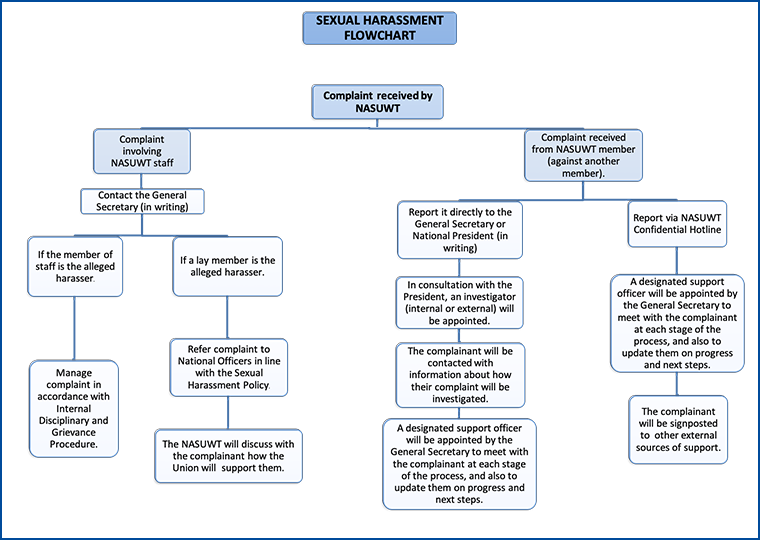NASUWT is committed to preventing and addressing all forms of sexual harassment and providing an environment free from any form of harassment to ensure that members, staff and third parties are treated with dignity and respect
Introduction
If you are being or have been sexually harassed
Reporting an allegation
Process summary flowchart
Introduction
NASUWT is committed to providing an environment free from any form of harassment, including sexual harassment, to ensure that all members, staff and third parties are treated, and treat others, with dignity and respect.
NASUWT’s Rules seek to regulate relations between members through actively opposing all forms of harassment and to protect and promote the interests of members.
NASUWT members and agents of the Union, including all lay officials, National Executive Members (NEMs) and National Officers, are expected to comply with this policy and any protocols, by-laws or other relevant procedures adopted by Conference or by the National Executive.
This policy applies to all members of the Union, including elected lay representatives.
This policy is relevant to Rule 27 of the Rules of the NASUWT and any Codes of Conduct of procedures issued by the Union.
The Union will ensure that all proceedings in respect of sexual harassment are progressed in accordance with this policy. In the event of any conflict, the procedure within this policy for progressing complaints on matters relating to sexual harassment shall take precedence.
Sexual harassment is unlawful under legislation including the Equality Act 2010 and the Sex Discrimination (Northern Ireland) Order 1976 (as Amended).
Acts of sexual harassment will be considered to be in breach of this policy, whether or not the sexual harassment is unlawful.
Sexual harassment is unwanted conduct of a sexual nature with the purpose or effect of violating a person’s dignity or creating an intimidating, hostile, degrading or offensive environment for that person.
In deciding whether an incident has the purpose or effect of violating a person’s dignity or creating an intimidating, hostile, degrading or offensive environment for that person, each of the following will be taken into account:
-
the perception of that person;
-
the other circumstances of the case; and
-
whether the conduct may reasonably be considered to have that effect.
A single incident can amount to sexual harassment.
Sexual harassment may include (NB this list is not exhaustive):
-
sexual comments or jokes;
-
taking and/or displaying sexually graphic pictures, posters or photos, including posts of a sexual nature, through contact on social media, downloaded images, electronic device screens or other means;
-
suggestive looks, staring or leering;
-
propositions and sexual advances;
-
making promises in return for sexual favours;
-
sexual gestures;
-
intrusive questions about a person’s private or sex life and discussing your own sex life;
-
spreading sexual rumours about a person;
-
coercion, including pressure for sexual favours;
-
sending sexually explicit emails or text messages;
-
unwelcome touching, hugging, massaging or kissing; or
-
criminal behaviour, including sexual assault, stalking, indecent exposure and offensive communications.
NASUWT recognises that sexual harassment also intersects with other forms of discrimination. Any reported sexual harassment incident will also consider whether there is another intersecting factor connected to the unwanted conduct. Where a complaint is made which intersects with another form of discrimination, the intersecting part will also be dealt with under this policy.
Harassment may also include conduct related to sex, sexual orientation, race, religion or belief, age, disability or gender reassignment.
This policy is also relevant to unwanted conduct more widely, including harassment on the grounds of nationality, ethnic or national origin, marital or civil partner status, pregnancy or maternity.
Harassment is unacceptable even if it does not fall within any of these categories.
It is also harassment to subject a person to less favourable treatment because they rejected or submitted to unwanted conduct, where the unwanted conduct is of a sexual nature or relates to sex or gender reassignment.
It is also unlawful and in breach of this policy to instruct, cause or induce and/or knowingly help another person to do anything which constitutes harassment or discrimination.
Sexual harassment and victimisation may include acts perpetrated by third parties. A third party in this context means anyone who is not either an NASUWT member or employee.
NASUWT does not tolerate sexual harassment by any third party, encourages anyone who experiences it to report it and will be proactive in taking action to protect members from sexual harassment and victimisation perpetrated by third parties.
NASUWT members who have engaged in unwanted conduct of a sexual nature which has the purpose or effect of violating someone’s dignity, or creating an intimidating, hostile, degrading, humiliating or offensive environment for them in any situation outside their NASUWT activity, are liable to be subjected to disciplinary procedures under this policy - even if the person affected by the sexual harassment was not protected by law.
In particular, members who hold office are placed in a position of trust and authority, so bringing them into contact with others who may be particularly at risk of sexual harassment or victimisation.
NASUWT has a duty to protect people who are likely to be targeted by known harassers. This might entail prohibiting membership of the Union or denying a member the right to hold office within the Union.
You do not need to be the intended target to be subject to sexual harassment. Harassment is also considered unlawful or in breach of this policy, and unwanted, if a person witnesses an act of harassment, language or behaviour that creates an intimidating, hostile, degrading or offensive environment.
If you are being or have been sexually harassed
You may speak to an NASUWT Designated Officer who can provide confidential advice and talk you through your reporting options. The Union will respect your right to privacy and confidentiality unless there is a serious and immediate concern for your safety or welfare.
There is no time limit to you reporting an incident of sexual harassment. Often the impact of sexual harassment is not felt or witnessed immediately. It is recognised that those who experience or witness sexual harassment or violence, or who provide support or assistance, may also experience trauma long after the incident took place.
You can report an incident, confidentially, via the Union’s ‘Hotline for reporting harassment’. The ‘Hotline’ permits members to report incidents anonymously.
If you experience or witness a serious incident of sexual harassment or sexual assault, you may choose to report the matter to the police and, if you suffered an assault, you may also choose to seek medical assistance, including specialist counselling support.
If you have been sexually assaulted, there are specialist helplines and other support available where you can talk through your options. These are listed in Annex 4 of the NASUWT Sexual Harassment Policy, which is available to download on the right/below.
If you choose to report the matter to the Union, we will discuss whether you want to report the matter to the police and we will support you if you choose to do so. The Union will not seek to pressure you to make any particular decision. If you do not want to tell the police, you do not have to.
In some circumstances, the Union may decide to tell the police where there is likely to be an ongoing risk to your safety or the safety of others. Before the Union reports a matter to the police, we will talk to you first and let you know when we have reported the matter to the police.
Reporting an allegation
Allegations of sexual harassment or other forms of harassment will be dealt with seriously and confidentially. Members should not fear victimisation when raising complaints.
If you wish to make a formal complaint about sexual harassment about another member or other members, you should submit it in writing to the General Secretary (or to the President if a complaint relates to the General Secretary) or by reporting the incident on the Union’s reporting ‘Hotline’.
If your complaint is against the General Secretary or National President, you should raise this with a Designated Officer who will advise on how your complaint can be progressed.
You may wish to talk through the complaint with a trusted person who may be willing to record your complaint/statement on your behalf.
You may speak to an NASUWT Designated Officer who can provide confidential advice and talk you through your reporting options.
The Union will respect your right to privacy and confidentiality, unless there is a serious and immediate concern for your safety or welfare.
For more details, please see the full policy on the right/below (login required).
Process summary flowchart

Tap/click the image to open in a larger format
Anonymous feedback
If you require a response from us, please DO NOT use this form. Please use our Contact Us page instead.
In our continued efforts to improve the website, we evaluate all the feedback you leave here because your insight is invaluable to us, but all your comments are processed anonymously and we are unable to respond to them directly.

